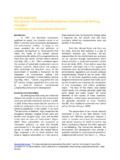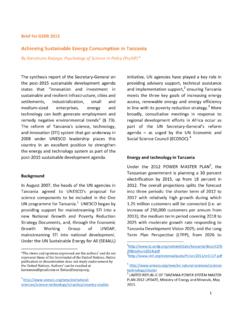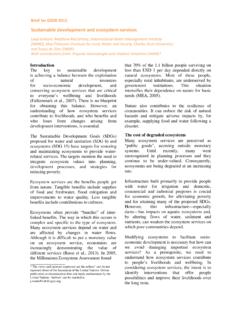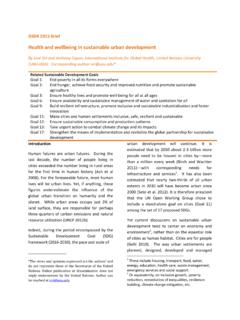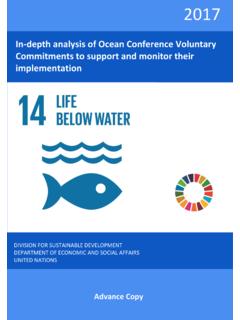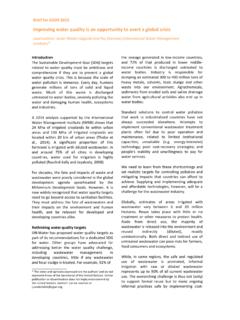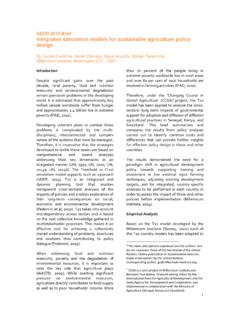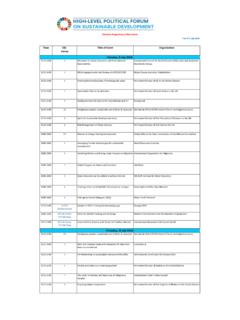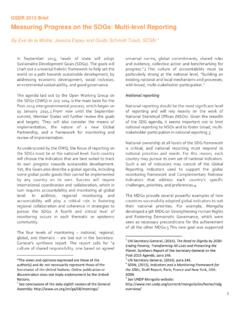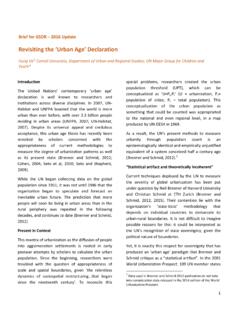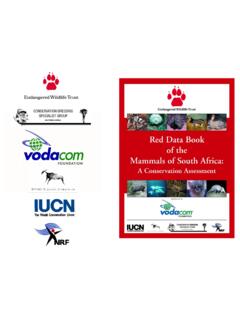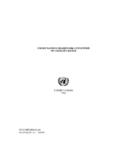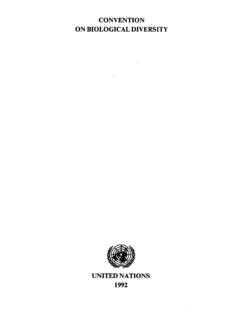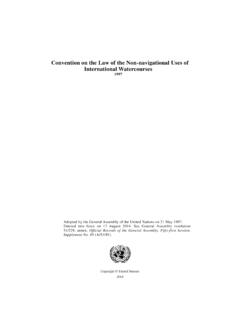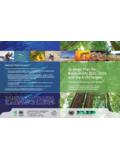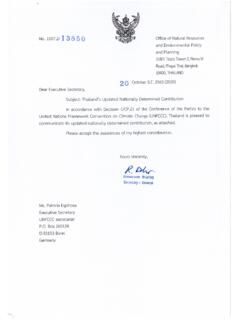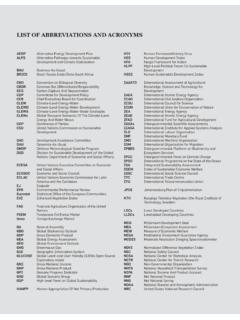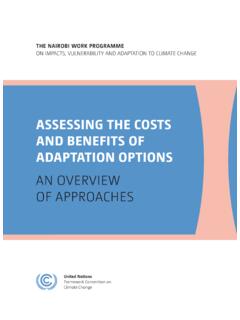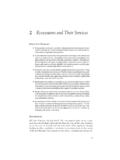Transcription of Sustainable Development in the Pacific: Progress and ...
1 Sustainable Development in the Pacific: Progress and Challenges Pacific regional Report for the 5 Year Review of the Mauritius Strategy for Further Implementation of the Barbados Programme of Action for Sustainable Development of SIDS (MSI+5). ESCAP Subregional Office for the Pacific, Suva, Fiji April 2010. _____. This document has been issued without formal editing. Preamble This report on Progress in the Pacific prepared in accordance with United Nations General Assembly Resolution 63/213 (February 2009). A draft version was tabled for discussion at the Pacific High Level Dialogue held in Port Vila, Vanuatu on 8 9 February 2010. Comments received during the meeting and the consultation period that followed have been incorporated into this final version. Assessment reports have also been prepared at the national level. Together the national and regional reports comprise the Pacific's submission to the High Level Meeting that will be convened in New York in September 2010 to mark the five year review point of the Mauritius Strategy (MSI+5).
2 ESCAP will submit the regional report to the United Nations Commission for Sustainable Development (CSD) and the ESCAP Special Body on the Pacific to be convened in conjunction with the ESCAP Commission Session in Korea The reports, as well as the outcome of the Pacific High Level Dialogue (the Port Vila Outcome Statement) should inform preparations for other reviews being held during 2010: the United Nations General Assembly high level review of the Millennium Development Goals; the high level session on biodiversity conservation ; and, recognizing that this MSI+5 review is taking place in this International Year of Biodiversity, the 10th Conference of the Parties to the convention on Biological Diversity. Acknowledgements This report was prepared by the ESCAP Subregional Office for the Pacific with assistance from Mr. Russell Howorth, Consultant. Feedback from member states and regional stakeholders during the High Level Dialogue held in Port Vila, Vanuatu on 8 9 February 2010, and the consultation period that followed, have been incorporated into this final version of the report.
3 Sustainable Development in the Pacific: Progress and Challenges 2. Pacific regional Report for the MSI + 5 Review Table of contents Executive Summary .. 4. Chapter 1 The Pacific: a region of Small Island Developing States .. 6. Economy ..6. Environment ..9. Isolation and 10. Chapter 2 Implementing the Mauritius National enabling 12. Role of regional and international organizations in promoting Sustainable 13. Civil society and Sustainable Development .. 18. Trade: globalisation and trade liberalisation .. 18. Access to and the provision of financial 21. Capacity Development .. 22. 24. Graduation from Least Developed Country (LDC) status .. 26. Monitoring and evaluation .. 26. Knowledge management and information for decision making .. 26. Chapter 3 Progress in key areas ..29. Climate change adaptation and sea level 29. 34. Intellectual property rights and 38. Biodiversity .. 39. Culture and 42. Natural and environmental disasters .. 44. Coastal and marine resources.
4 47. Agriculture and rural 52. 55. Transport and 59. Sustainable production and 61. Information and communications technologies (ICT) .. 61. Chapter 4 Progress towards the Millennium Development Goals (MDGs) ..63. Chapter 5 Impact and responses to the recent global Chapter 6 Sustainable Development : a way forward for the Annex Further review of Progress ..75. Management of 75. Freshwater resources .. 77. Land management, forestry and mining .. 81. Tourism .. 87. Sustainable capacity Development and education for Sustainable Development .. 89. Sustainable Development in the Pacific: Progress and Challenges 3. Pacific regional Report for the MSI + 5 Review Executive Summary The Mauritius Strategy for the Further Implementation of the Barbados Programme of Action for the Sustainable Development of Small Island Developing States (MSI) was adopted in 2005. To mark the passing of the first five years of the strategy, United Nations General Assembly has called for a review of Progress towards implementing the MSI.
5 The review should provide the international community with an opportunity to conduct an assessment of the Progress made, lessons learned and constraints encountered in the implementation of the Mauritius Strategy . United Nations General Assembly Resolution 63/213. This report on Progress in the Pacific provides a consolidated view of actions taken to implement the Mauritius Strategy in the region. It covers the Pacific SIDS of the Cook Islands, the Federated States of Micronesia, Fiji, Kiribati, Nauru, Niue, Palau, Papua New Guinea, the Republic of the Marshall Islands, Samoa, the Solomon Islands, Timor Leste, Tonga, Tuvalu, and Vanuatu. The report highlights established frameworks for action, concrete actions taken, lessons learned, remaining challenges for the way forward and the effectiveness of implementation support and mechanisms. Box 1: The Mauritius Strategy An international meeting on small island developing states was held in Port Louis, Mauritius in January 2005.
6 All Pacific SIDS were represented at the meeting, many by their Head of Government, and reaffirmed their commitment to Sustainable Development through the Mauritius Declaration. The meeting adopted a new strategy for Sustainable Development . The Mauritius Strategy for Implementation (MSI) recognizes the unique vulnerabilities of SIDS and maps out the actions needed at national, regional and international levels to address Sustainable Development challenges. The strategy comprises twenty sections: I. Climate change and sea level rise XII. Graduation from least developed country status II. Natural and environmental disasters XIII. Trade: globalization and trade liberalization III. Management of wastes XIV. Sustainable capacity Development and education for IV. Coastal and marine resources Sustainable Development V. Freshwater resources XV. Sustainable production and consumption VI. Land resources XVI. National and regional enabling environments VII.
7 Energy resources XVII. Health VIII. Tourism resources XVIII. Knowledge management and information for IX. Biodiversity resources decision making X. Transport and communication XIX. Culture XI. Science and technology XX. Implementation The final chapter on implementation highlights the most urgent priorities for Sustainable Development and is therefore the main focus of this report. The full text of the Mauritius Strategy is available at The Pacific is a diverse region made up of countries and territories with varying land sizes, populations, natural resources, economies and cultures. The main economic sectors in the region are tourism, fisheries, forestry and agriculture. Remittances play an increasingly important role in the economies of Pacific SIDS, contributing towards economic growth and sustaining livelihoods, including meeting education and basic needs. Geographic isolation and the small land area and population sizes of SIDS result in unique challenges for Sustainable Development .
8 Pacific SIDS suffer from diseconomies of scale in production and exchange of goods and services, remoteness from export markets and a high vulnerability to natural disasters and climate change. Notwithstanding these Sustainable Development in the Pacific: Progress and Challenges 4. Pacific regional Report for the MSI + 5 Review challenges, the environment, culture and uniqueness produced by isolation has created a strong tourism industry with prospects for continued growth. Isolation has also produced resilient communities with strong traditions, cultures and coping capacity. Paradoxically, Pacific SIDS may be described as resilient social systems which can succumb to a knock . out event at any time. The Sustainable Development agenda is a broad one, aiming to ensure inclusive economic growth for current and future generations. Economic, social and environmental dimensions comprise the pillars of a holistic and integrated approach. The focus of this report is on the key areas identified in the Mauritius Strategy where the most urgent Sustainable Development challenges exist.
9 The report does not follow the structure of the Mauritius Strategy, but rather attempts to merge related information to give a clear picture of Progress . Pacific SIDS have made considerable Progress towards implementing the Mauritius Strategy since its adoption in 2005. Acknowledging that Sustainable Development is primarily a national responsibility, this Progress has been mainly due to national efforts. However, the ongoing support of regional and international organisations, civil society organizations and Development partners has been crucial and is greatly acknowledged. This report focuses on regional Progress , providing a detailed overview of the regional frameworks and concrete actions that have been taken to support Sustainable Development at the national level. The outcomes of the Pacific High Level Dialogue on the Implementation of the Mauritius Strategy, held in Port Vila on 8 9 February 2010, provides the roadmap for the future of Sustainable Development in the region.
10 Chapter 1 gives a brief overview of the Pacific for those readers who are less familiar with the region. Chapter 2 discusses Progress in strengthening the environment and support mechanisms for implementation of the Mauritius Strategy. Chapters 3 reviews Progress against key areas such as climate change, energy, culture, biodiversity, transport and ICT. Chapter 4 provides a brief overview on Progress against the Millennium Development Goals (MDGs) and Chapter 5 reviews the impacts of the recent global economic crisis. Recommendations on the way forward for the region are provided in Chapter 6. Analysis of Progress towards Sustainable Development in other areas is provided in the Annex. Sustainable Development in the Pacific: Progress and Challenges 5. Pacific regional Report for the MSI + 5 Review Chapter 1. The Pacific: a region of Small Island Developing States The Pacific is a diverse region made up of countries and territories with varying land size, population, natural resource base, economy and cultures.
